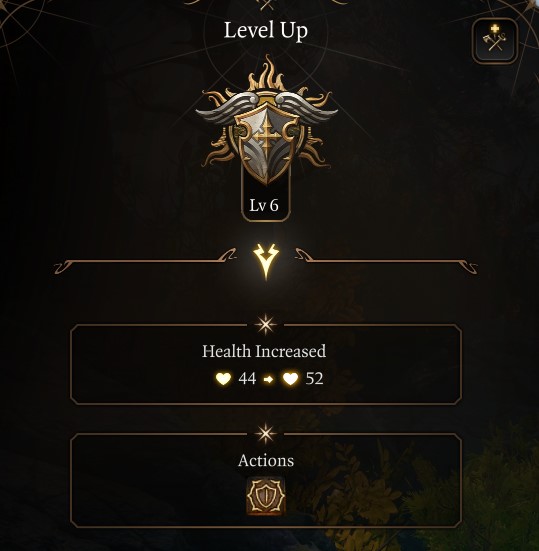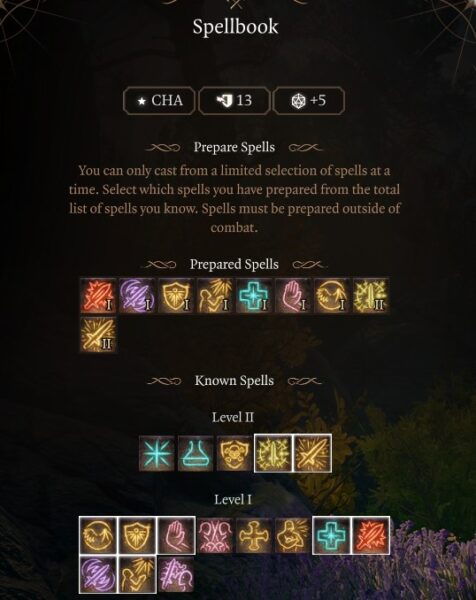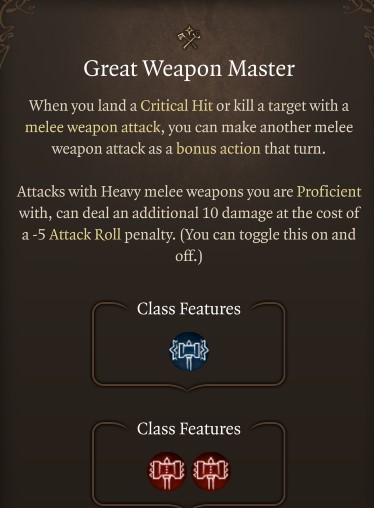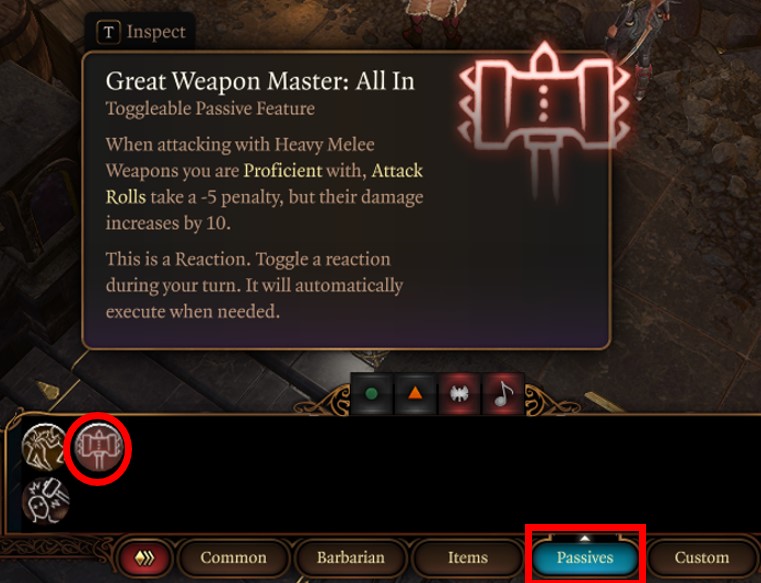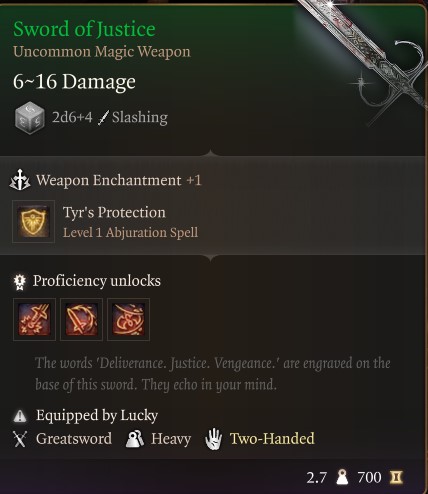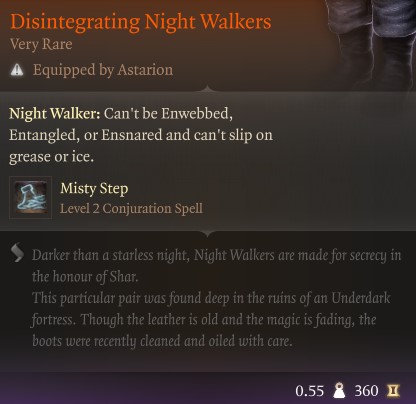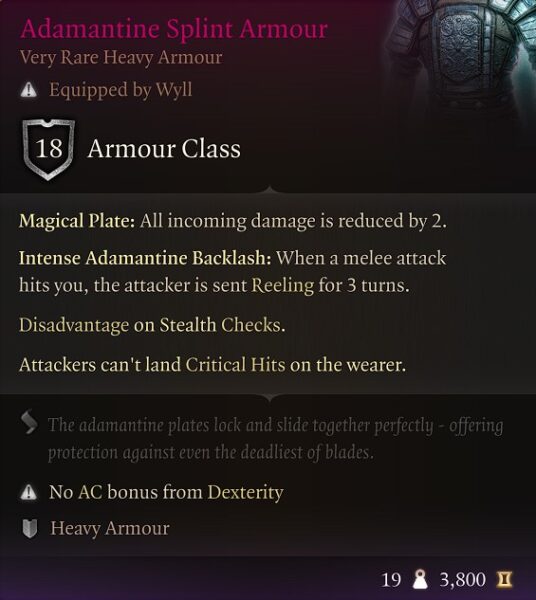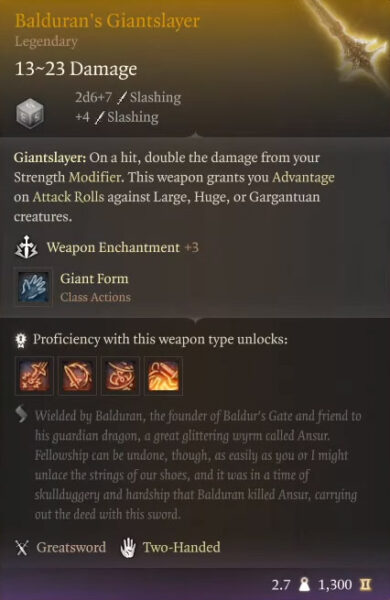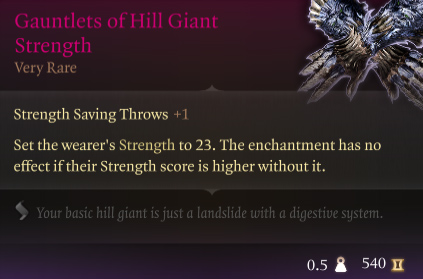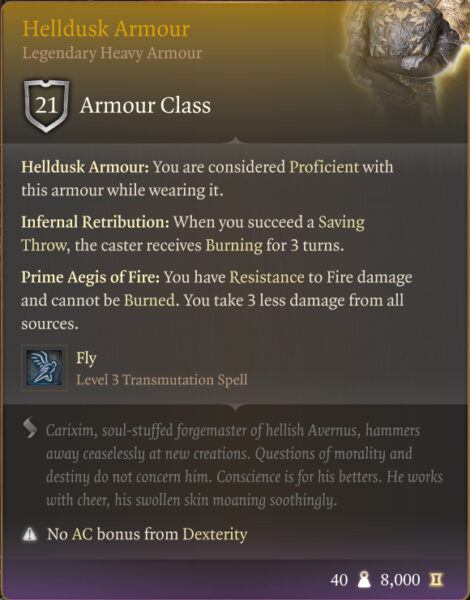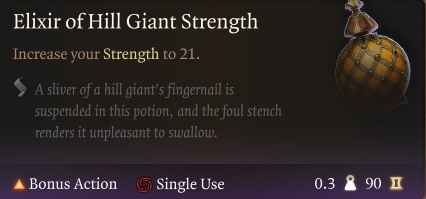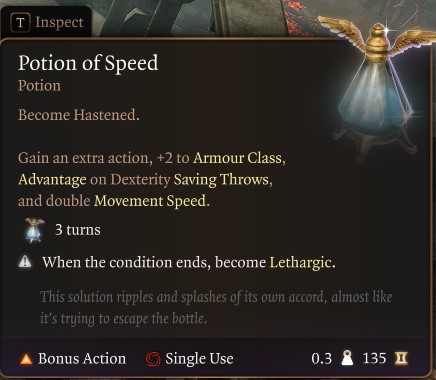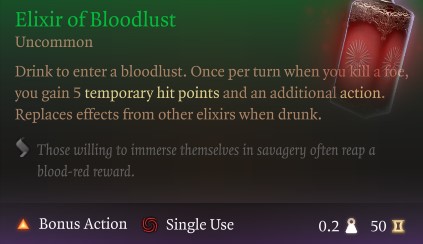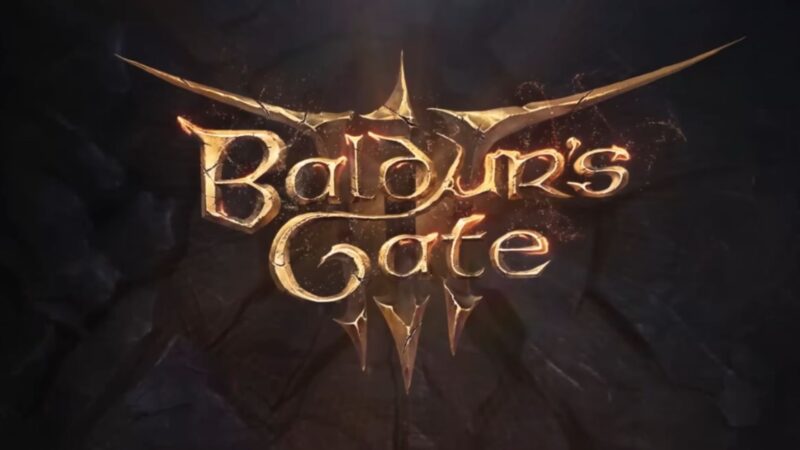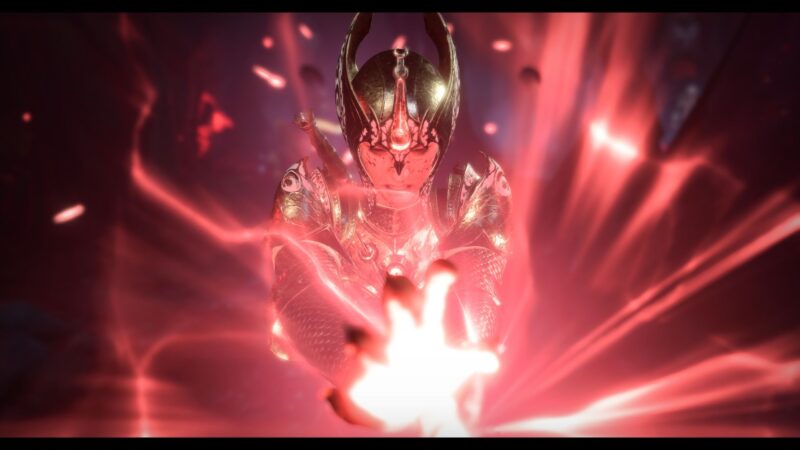This guide focuses on the best Paladin build in Baldur’s Gate 3, the Oathbreaker subclass, and includes all components to build a powerful character.
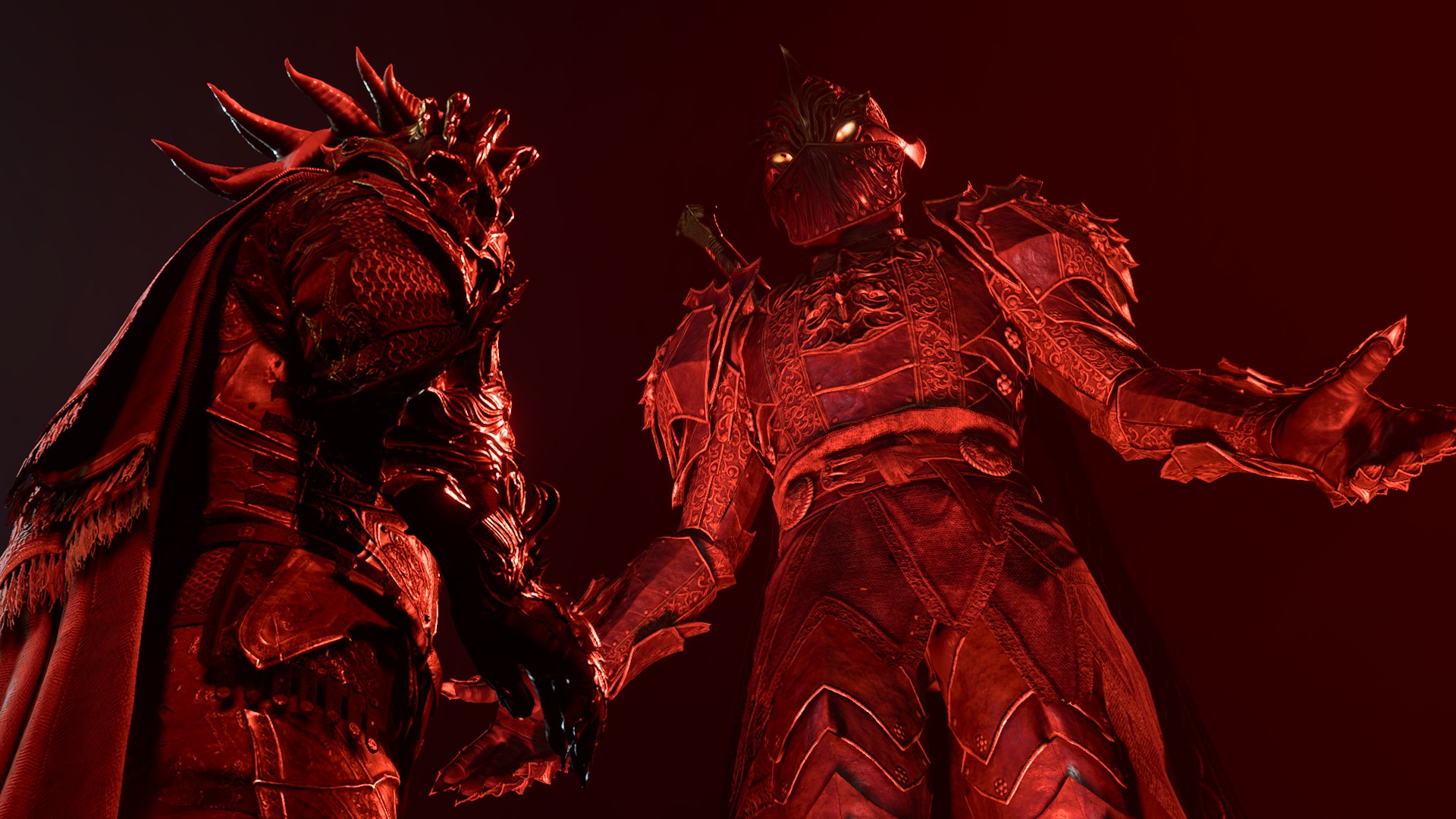
- Changes in Patch 8
- How to Become an Oathbreaker
- Paladin Divine Smite Explained
- Character Creation
- Level Progression
- Alternative Build
- Best Gear
- Consumables, Potions, and Items
- Permanent Bonuses
- Combat, Gameplay, and Tips
- Oathbreaker Changes in Patch 7
- Build Summary Guide
- Q. What happens if I become an oathbreaker in Paladin BG3?
- Q. Is it better to break Paladin oath BG3?
- Q. How to quickly become an oathbreaker in Paladin BG3?
This build page has been updated for the Patch 8 version of Baldur’s Gate 3.
Everything About the Oathbreaker Paladin in Baldur’s Gate 3
The Oathbreaker Paladin focuses on aggression, melee range with high damage, and mechanics like Smite, Dreadful Aspect, and Hellish Rebuke, making it a juggernaut on the battlefield. Oathbreaker Paladin is a unique subclass that focuses on darkness and corruption, allowing you to play an antihero or a fallen Paladin seeking redemption. Consequently, the Oathbreaker Paladin is a great choice for players focused on dealing with damage.
The Oathbreaker Paladin is a unique choice that is usually focused on “bad” moral decisions. You can remove this subclass, and breaking your Oath in later Acts becomes harder. Additionally, the strength of the build is being able to control, manipulate, and summon undead. Consider this the morally grey Paladin that has strayed from their Oath with huge damage and utility.
Oathbreaker is one of the most unique subclasses in BG3, and it requires a specific oathbreaking to unlock. Additionally, Oathbreaker seems to be difficult to gain in Act 2 and Act 3, depending on NPC locations, so be careful when transitioning to Oathbreaker.
| Pros of Oathbreaker Build | Cons of Oathbreaker Build |
|---|---|
| Crowd Control | Spell Slot Starved |
| High Burst Damage | Limited Spells |
| Heavy Armour | Complex |
Oathbreaker Paladin Changes in Patch 8
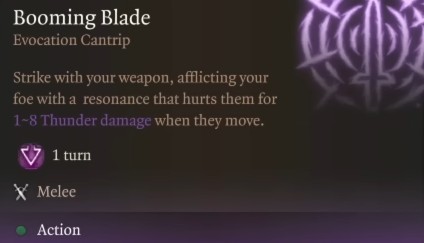
The biggest changes to the Oathbreaker Paladin build in Patch 8 of Baldur’s Gate 3 come from the addition of new subclasses, spells, and cantrips. While three enemies have been buffed in Tactician and Honour modes, including the difficult Balthazar, the overall flow of combat remains largely the same. Furthermore, Booming Blade now offers a better advantage by adding thunder damage to each attack, making it a strong option. Especially when multiclassing into Hexblade Warlock, Sorcerer, or Wizard, or by selecting it with the High Elf’s bonus cantrip. While the Half-Orc race remains the top pick for pure melee damage, Booming Blade adds versatility and burst potential to hybrid builds.
Oathbreaker Paladin Class Features & Mechanics
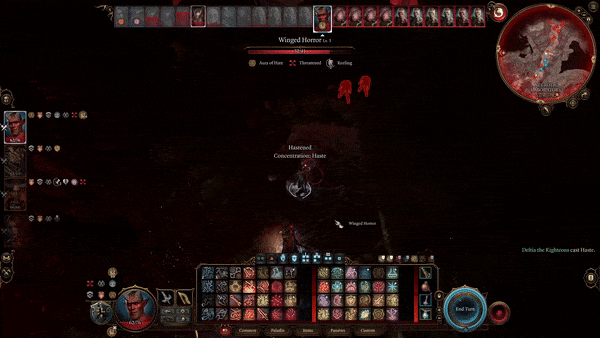
The following list presents all the essential Paladin Class Mechanics and Features in Baldur’s Gate 3:
- Primary Ability: Charisma
- Saving Throw: Wisdom and Charisma
- Subclass: Oathbreaker
- Armour Proficiency: Light Armour, Medium Armour, Heavy Armor, Shields
- Weapon Proficiency: Simple Weapons, Martial Weapons
- Preferred Weapon: Greatsword
- Preferred Armor: Heavy Armour
- Spiteful Suffering: the target takes 1d4 + Charisma Modifier damage each turn and gains Advantage against the enemy.
- Divine Smite: Spend spell slots to deal additional radiant damage on a successful melee attack.
- Control Undead: You can use your Channel Divinity to control undead creatures.
- Dreadful Aspect: This allows you to do an area-based crowd control CC using an action.
Paladin Spell Mechanics
- Cantrips: are like spells, but you can cast them infinitely, and they don’t take your spell slots. For Paladin, you won’t have access to these unless from a race choice.
- Spell Slots: will use your spell slots, which are a limited resource during combat and will require a long rest in order to refill.
- Prepared Spells: a Paladin mechanic that allows you to swap in and out spells prior to combat.
- Concentration: is a spell mechanic in Baldur’s Gate 3 that some Spells require to maintain and keep their magic active.
How to Become an Oathbreaker Paladin in Baldur’s Gate 3
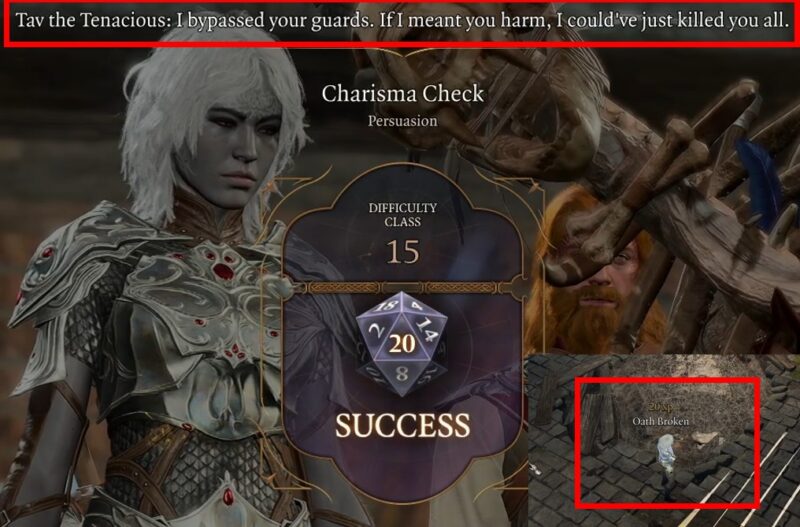
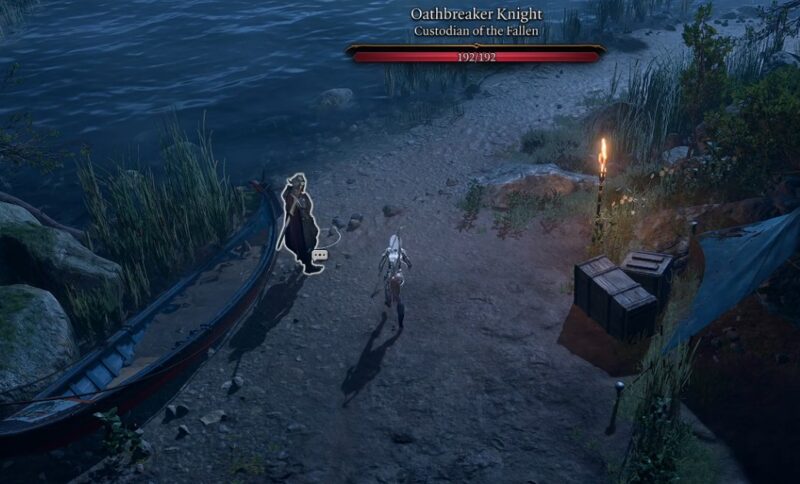
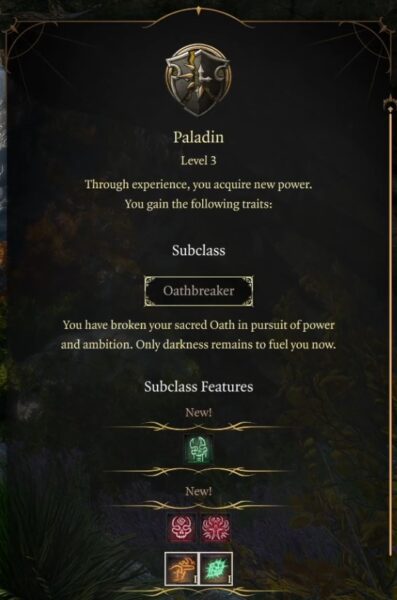
There are multiple ways to become an Oathbreaker Paladin in Baldur’s Gate 3. You will need to break your promise, which involves attacking and/or killing an innocent NPC. At Level 2, you can initiate this by tricking the two Tieflings holding Lae’zel hostage. Additionally, another way is to kill an innocent NPC sleeping. Once this is done, you will receive an NPC dialogue from the Oathbreaker Knight. Go to your camp and talk with him directly in order to access the new subclass.
To become an Oathbreaker Paladin in Baldur’s Gate 3, follow these steps.
- Lie or go back on a promise and kill an innocent (Say ‘I won’t attack, then you attack anyway post dialogue)
- You are visited by the Oathbreaker Knight Cutscene
- Visit your Camp find the NPC Oathbreaker Knight and talk
- Accept your Oathbreaker and gain access to the subclass
- You can drop Oathbreaker and it’s not a permanent choice
Paladin Divine Smite Explained
Divine Smite is a signature ability of the Paladin class in Baldur’s Gate 3. It allows a Paladin to expend a spell slot to deal additional radiant damage to a creature they have hit with a melee weapon attack. The amount of extra damage is equal to 2d8 for a 1st-level spell slot, plus 1d8 for each spell level higher than 1st. The damage increases by 1d8 if the target is an undead or a fiend.
Divine Smite can be toggled on or off in the reactions menu under the user interface. This allows you to make a decision if you want to use it or not. Significantly, this is very important because the Paladin can run out of Spell Slots quickly, limiting damage. The last thing you want is to expend a spell slot needlessly on a weak creature.
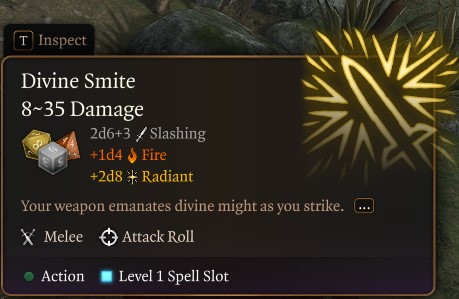
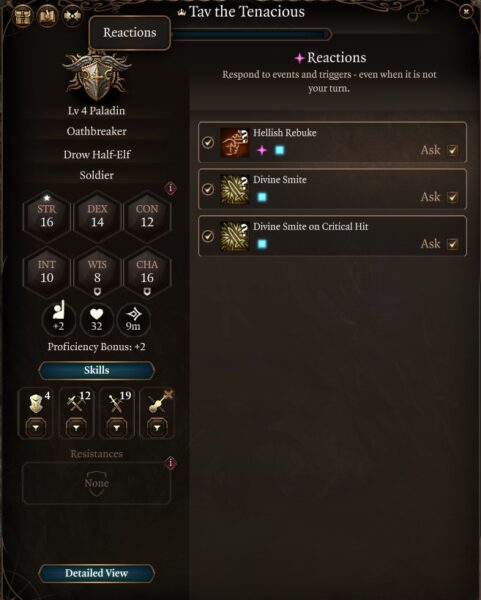
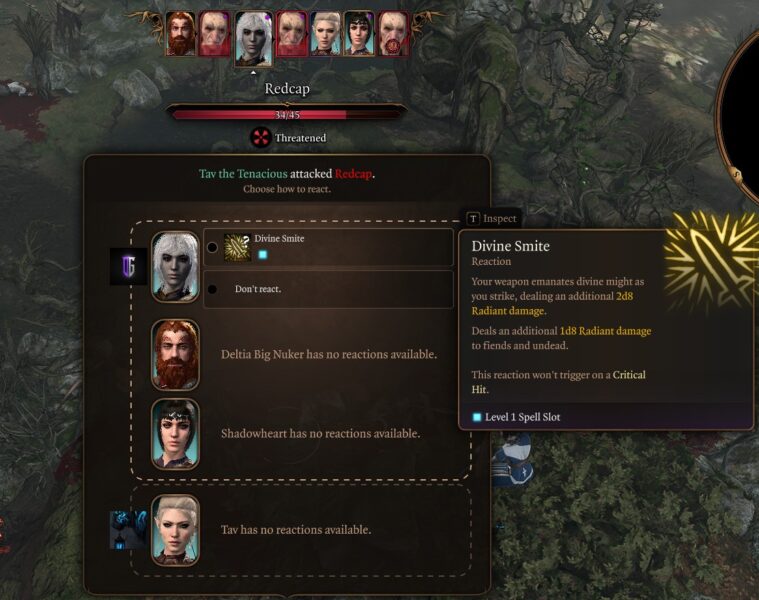
Here are some tips for using the Best Paladin Build to use Divine Smite effectively in Baldur’s Gate 3:
- Save your higher-level spell slots for tougher enemies.
- Use Divine Smite against enemies that are vulnerable to radiant damage.
- Consider using Divine Smite on a critical hit, as this will maximize the amount of damage you deal.
- Don’t be afraid to use Divine Smite multiple times per turn, especially if you are facing a group of enemies.
Character Creation
| Category | Selection |
|---|---|
| Character | Origin – Custom character |
| Race | Half-Orc |
| Racial Bonus | Relentless Endurance, Darkvision, Savage Attack |
| Class | Paladin |
| Subclass | Vengeance (Oathbreaker at level 2) |
| Spells | Searing Smite, Thunderous Smite, Shield of Faith, Divine Favor, Cure Wounds |
| Background | Soldier |
| Ability Score | STR: 16 DEX: 10 CON: 14 INT: 8 WIS: 10 CHA: 16 |
| Skill Proficiencies | Persuasion and Insight |
Best Race Choice Oathbreaker Paladin Build
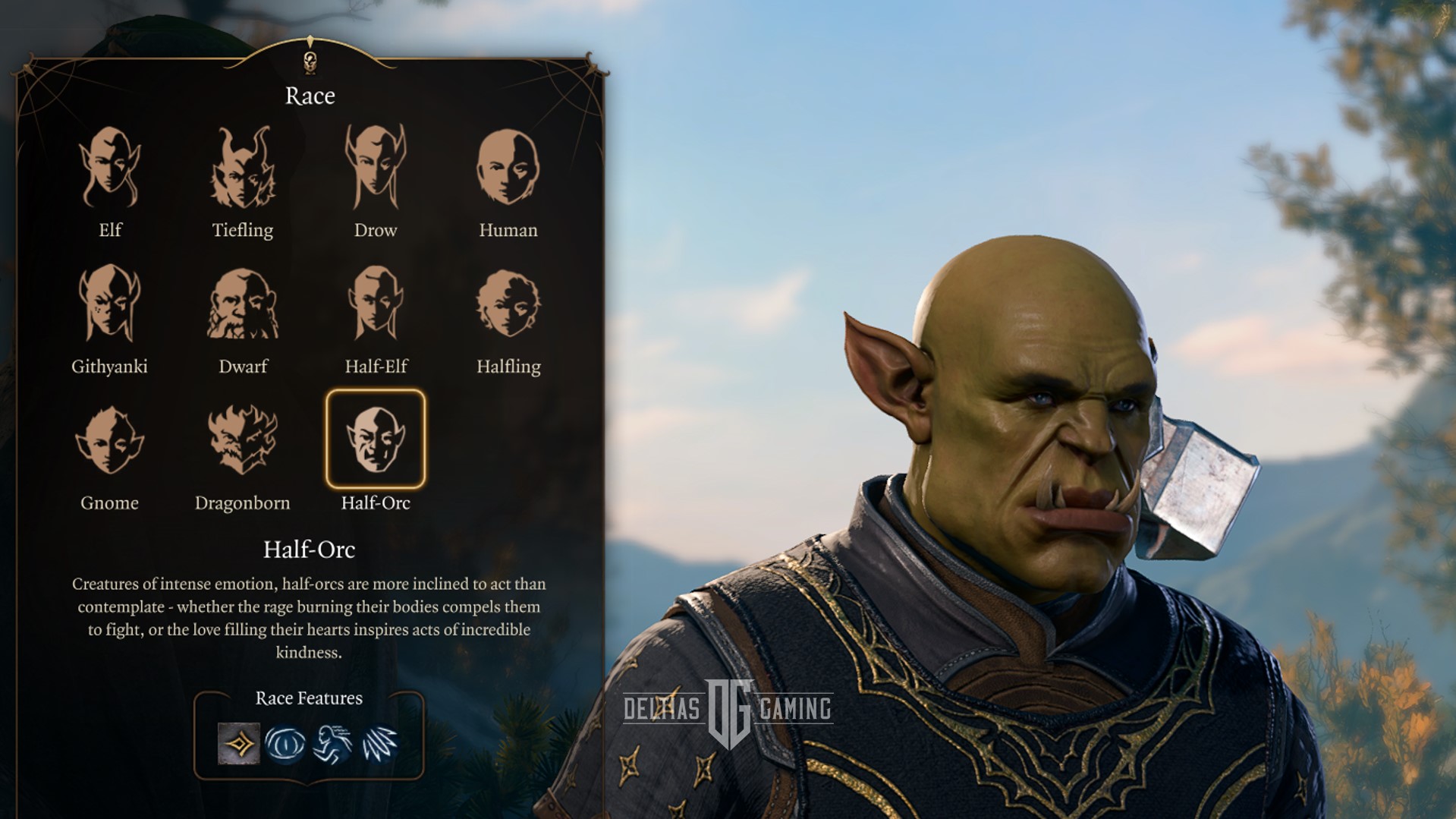
The Half-Orc is the best race choice for Oathbreaker Paladin in Baldur’s Gate 3 because the Relentless Endurance racial feature can save you from death dropping to 0 hit points you stay at 1 for a turn. The Half-Orc’s savage attack allows for extra damage and Darkvision is vital playing in the Underdark. A secondary choice is Zariel Tiefling because of fire resistance and two free smite spells, Searing and Branding.
Here’s the best Race choice for a Paladin Build:
| Half-Orc | Zariel Tiefling |
|---|---|
| Relentless Endurance | Hellish Resistance |
| Menacing | Searing Smite |
| Savage Attack | Branding Smite |
| Darkvision | Darkvision |
The Paladin’s racial choice will not influence ability score, as everyone should get a +2 and +1 to spend regardless. Consequently, this frees your race choice up to not completely hinder yourself based on ability score, but race features. Each of these races offers unique advantages that can enhance your combat prowess, survivability, or utility. Additionally, consider the roleplaying opportunities and character concepts that resonate with you when playing the Best Baldur’s Gate 3 Paladin Oathbreaker Build.
Oathbreaker Paladin Subclass Features
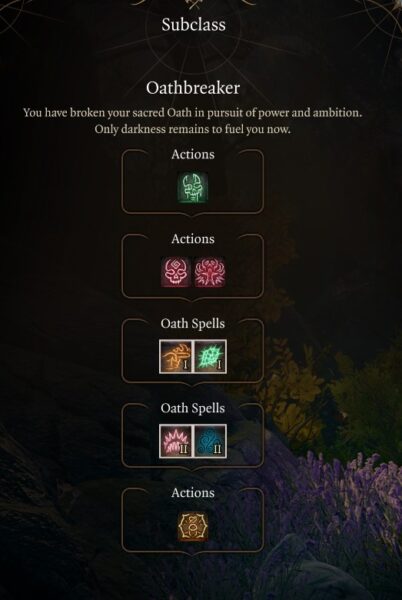
The Oathbreaker Paladin in Baldur’s Gate 3 has high damage and the ability to control undead. The Spiteful Suffering subclass ability adds necrotic damage to targets and you get Hellish Rebuke adding damage passively. Additionally, at various levels, you unlock useful spells and skills to control and manipulate undead. Consider this your go-to subclass for the “bad” Paladin playthrough.
Oathbreaker Subclass Features in Baldur’s Gate 3:
- Spiteful Suffering (Level 1) – The target takes 1d4+3 Necrotic damage each turn and Attack Rolls against it have Advantage.
- Control Undead (Level 3) – Use the power of your Oath to gain control over an undead creature. The undead will follow you around and attack your enemies.
- Dreadful Aspect (Level 3) – Let your darkest emotions burst forth as a menacing pulse to Frighten nearby enemies.
- Hellish Rebuke (Level 3) – React to your next attacker with flames that deal 2~20 Fire damage.
- Inflict Wounds (Level 3) – 3-30 necrotic damage Putrify a creature with the necrotic energy filling your hands.
- Crown of Madness (Level 5) – Instill madness in a humanoid enemy, making them attack the creature closest to them (other than you), even if it’s allied.
- Darkness (Level 5) – Create a dark shroud that Heavily Obscures and blinded condition creatures within.
- Aura of Hate (Level 7) – You and any nearby fiends (and undead) gain additional damage dealt with melee weapons equal to your charisma modifier. The aura disappears if you fall Unconscious.
- Bestow Curse (Level 9) – Curse a creature with your touch. The curse either bestows Disadvantage on checks and Saving Throws or attacks, lets you deal additional damage to the target, or robs it of its actions.
- Animate Dead (Level 9) – Create an undead servant from a corpse.
Best Oathbreaker Backgrounds
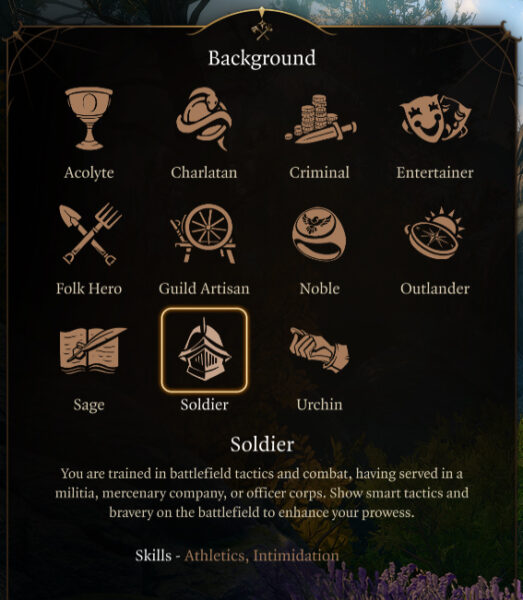
Soldier is the Best Background for the Best Paladin Build in Baldur’s Gate 3 because you gain proficiency in Athletics and Intimidation. Athletics scales with Strength while Intimidation scales with Charisma ability score thus they will help you both in combat situations and while exploring. Furthermore, this choice mostly influences roleplaying and dialogue options aspects and allows you to create unique characters when playing the Best Baldur’s Gate 3 Paladin Oathbreaker Build.
Here’s a list of the best backgrounds for an Oathbreaker Paladin:
- Soldier: Proficiency in Athletics and Intimidation. You are trained in battlefield tactics and combat, having served in a militia, mercenary company, or officer corps. Soldier companions in BG3 are Jaheira and Lae’zel.
- Noble: Proficiency in History and Persuasion. You were raised in a family among the social elite, accustomed to power and privilege. A noble companion is Minthara.
- Guild Artisan: Proficiency in Insight and Persuasion. Your skill in a particular craft has earned you membership in a mercantile guild, offering privileges and protection while engaging in your art. No Guild Artisan companions in BG3.
Best Oathbreaker Paladin Ability Score
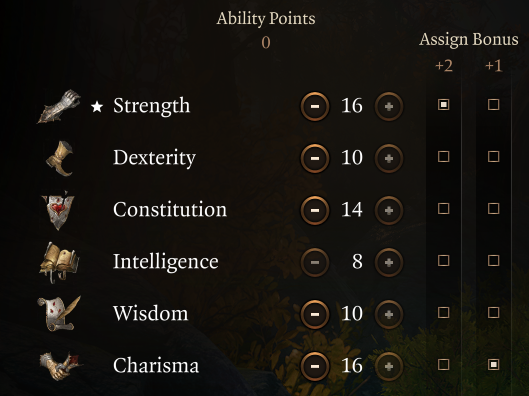
Below is the best ability score to unlock the full potential of an Oathbreaker Paladin in Baldur’s Gate 3:
| Ability | Points Goal |
|---|---|
| Strength | 16 |
| Dexterity | 10 |
| Constitution | 14 |
| Intelligence | 8 |
| Wisdom | 10 |
| Charisma | 16 |
The Best Ability Score for the Paladin is 16 Strength and 16 Charisma. That way, your melee abilities will do a lot of damage in combination with spells, specifically Divine Smite. Secondly, the next priority is the Constitution to 14 so that you have a large enough health pool to survive. Furthermore, hitting Strength and Charisma at 16 is critical for the optimal damage setup for the Best Baldur’s Gate 3 Paladin Oathbreaker Build.
After you choose the class, subclass, race, and background the game will automatically distribute your abilities in the character creation abilities tab. You will need to reprioritize the stats for the chart for an optimal Paladin build. Simply use the plus-minus in the character creator and make sure you have the suggested race, or the numbers will be off. If you don’t reach these numbers due to racial choice, drop your Wisdom lower.
Best Recommended Skills for Oathbreaker Paladin
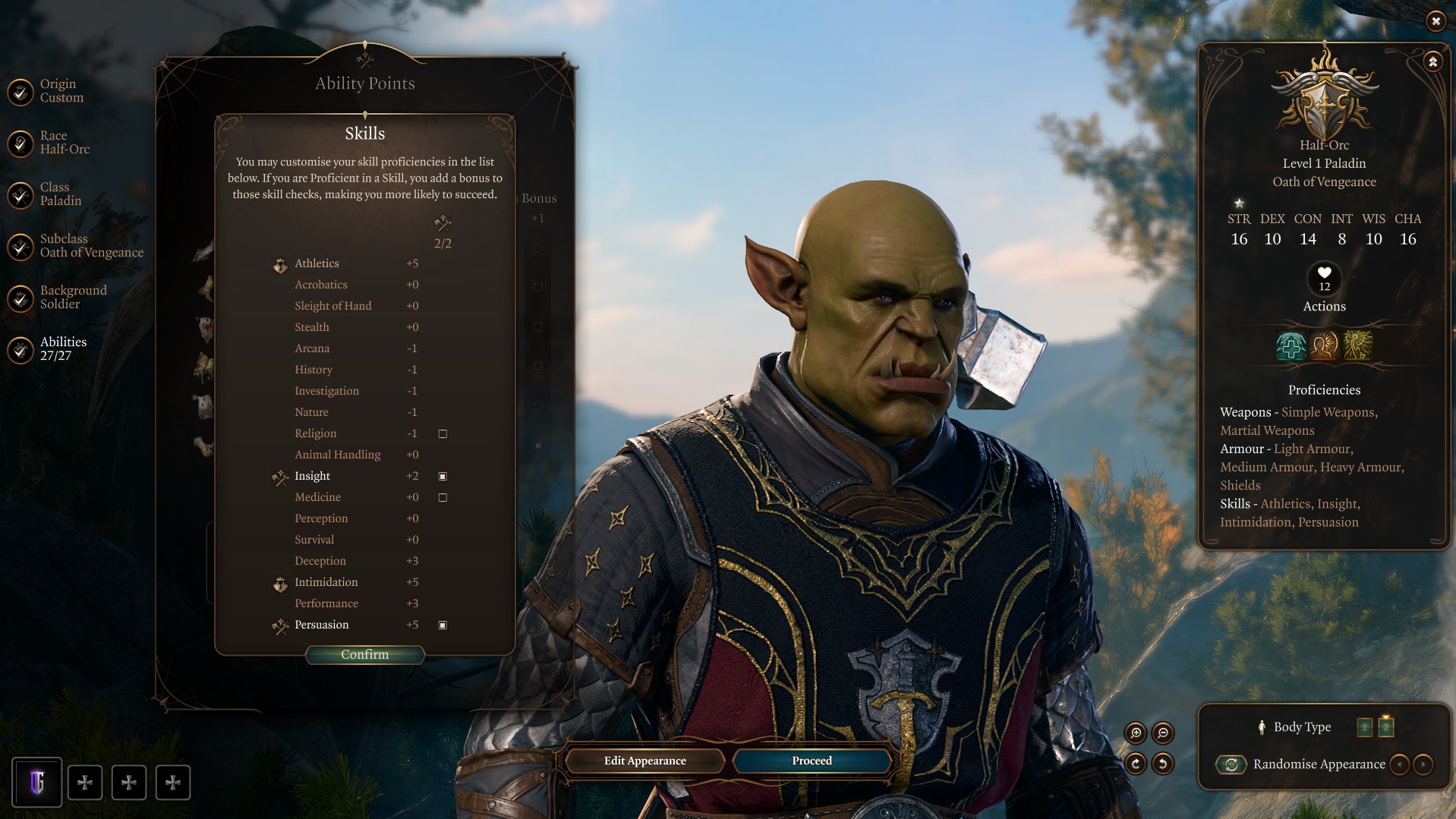
Persuasion and Insight are the best skills for the Paladin in Baldur’s Gate 3 because they complement your class abilities and enhance your effectiveness in various situations. In Baldur’s Gate 3, skills represent the abilities and proficiencies of your character that allow them to perform various actions and interact with the game world. Skills are associated with specific attributes and are used to determine the success or effectiveness of certain actions or abilities. Finally, they can be edited during character creation or with companions, during respec or reroll screen.
Here are the best skills for Paladin in Baldur’s Gate 3:
- Persuasion is a Charisma Skill used entirely for dialogue Ability Checks.
- Insight is a Wisdom skill used in dialogue and exploration.
While these skills are well-suited for the build, it’s important to consider your character concept and the specific challenges you may face in Baldur’s Gate 3. Furthermore, the selection of skills should align with your intended playstyle, complement your party composition, and reflect the narrative and roleplaying aspects of your character when playing the Best Baldur’s Gate 3 Paladin Oathbreaker Build.
Best Companions for Paladin Oathbreaker in Baldur’s Gate 3
For Companions for the Best Paladin Build, we recommend range and support characters. The idea is, that your character charges in melee range with support, range damage, or even stealth attacks. If you have multiple melee characters, 2-3, it can be troublesome in close-quarters combat.
- Shadowheart (Cleric): buffs, healing, and crowd control.
- Gale (Wizard): range magic damage, area damage, and crowd control.
- Astarion (Rogue): burst damage, lockpicking, and range if needed.
It’s important to note that party composition and synergy play a significant role in determining the effectiveness of your companions. Consider the strengths and weaknesses of each companion and how they align with your main character’s abilities and playstyle. You can go more range with Wyll or a double melee setup with Lae’zel. Also, feel free to swap out and explore different options.
Oathbreaker Paladin Spell Slots
Below is a list and chart that shows the levels and spell slots unlocked for the Oathbreaker Paladin class in Baldur’s Gate 3:
| Paladin Level | 1st | 2nd | 3rd |
|---|---|---|---|
| Level 1 | 0 | 0 | 0 |
| Level 2 | 2 | 0 | 0 |
| Level 3 | 3 | 0 | 0 |
| Level 4 | 3 | 0 | 0 |
| Level 5 | 4 | 2 | 0 |
| Level 6 | 4 | 2 | 0 |
| Level 7 | 4 | 3 | 0 |
| Level 8 | 4 | 3 | 0 |
| Level 9 | 4 | 3 | 2 |
| Level 10 | 4 | 3 | 2 |
| Level 11 | 4 | 3 | 3 |
| Level 12 | 4 | 3 | 3 |
Oathbreaker Paladin Illithid Powers
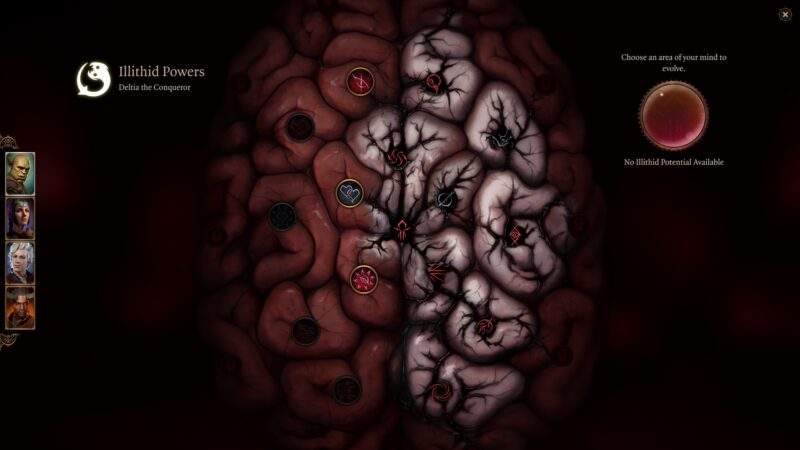
Illithid Powers are unlocked later in the game when you learn more about the Mind Flayers and tadpoles. You can gain jars of Mind Flayer Parasite Specimens and consume them to gain one point. Consequently, this is essentially another skill tree advancement with some very strong powers. If you decide to advance this skill line, these are the choices we suggest.
Here are the best Illithid Powers for the Paladin Build:
| Luck of the Far Realms | When you make a successful Attack Roll against a foe, you can change that hit into a Critical Hit. |
| Psionic Backlash | When an enemy within 9m casts a spell, you can use your reaction to inflict ld4 Psychic damage to the caster per the spell’s level. |
| Ability Drain | Once per turn, when you make an Attack Roll, the attack reduces that target’s corresponding Ability by 1. This is another useful passive that helps debuff enemies and doesn’t require action or bonus actions. |
| Repulsor | Massive area knockback that can hit friendlies. |
Keep in mind, that you make an important decision in Act 3 of the game to advance these powers or not. For the sake of not spoiling things, realize there will be consequences when taking these powers with the Best Baldur’s Gate 3 Paladin Oathbreaker Build.
Related:
Best Oathbreaker Paladin Level Progression
| Level | Class | Selection |
|---|---|---|
| 1 | Paladin | Lay on Hands, Divine Sense |
| 2 | Paladin | Break Oath to Unlock Subclass, Searing Smite, Thunderous Smite, Shield of Faith, Divine Favor, Cure Wounds |
| 3 | Paladin | Command, Hellish Rebuke, Inflict Wounds, Dreadful Aspect, Control Undead |
| 4 | Paladin | Feat: Ability Improvement Strength, Protection from Evil and Good |
| 5 | Paladin | Extra Attack, Branding Smite, Crown of Madness, Darkness |
| 6 | Paladin | Aura of Protection, Magic Weapon |
| 7 | Paladin | Aura of Hate, Lesser Restoration |
| 8 | Paladin | Feat: Great Weapon Master |
| 9 | Paladin | Bestow Curse, Animate Dead, Blinding Smite, Elemental Weapon |
| 10 | Paladin | Aura of Courage, Revivify |
| 11 | Fighter | Defence Fighting Style, Second Wind |
| 12 | Fighter | Action Surge |
Alternative Oathbreaker Paladin Build
If you’re aiming for a stronger start in Act 1, the Warlock/Paladin multiclass combo is a top-tier choice. Just two levels in Hexblade Warlock offer a powerful early-game spike, granting you potent melee scaling and spellcasting tools. After hitting level 3, transition into Paladin and choose the Oath of Vengeance subclass for enhanced mobility and high single-target burst. With five total levels invested, you’ll enjoy excellent melee potential and movement options. To cap off the build, consider taking levels in Fighter with the Eldritch Knight subclass, adding even more spellcasting versatility and sustained weapon damage to your arsenal.
Read More: All Bosses in Baldur’s Gate 3 Listed
| Level | Class | Selection |
|---|---|---|
| 1 | Warlock | Hexblade, Shield, Hellish Rebuke, Booming Blade, Eldritch Blast |
| 2 | Warlock | Wrathful Smite, Hex spells, One with Shadows, Devil’s Sight Invocations |
| 3 | Paladin | Multiclass Paladin, Vengeance Subclass |
| 4 | Paladin | Great Weapon Fighting, Command, Thunderous Smite, Divine Favour, Shield of Faith, Cure Wounds |
| 5 | Paladin | Protection from Good and Evil |
| 6 | Paladin | Great Weapon Master Feat, Compelled Duel |
| 7 | Paladin | Drop Compelled, select Magic Weapon, Lesser Restoration |
| 8 | Paladin | Aid spell |
| 9 | Fighter | Multiclass Fighter, Defense Fighting Style |
| 10 | Fighter | Action Surge |
| 11 | Fighter | Eldritch Knight subclass, Chromatic Orb, Magic Missile spells, Bursting Sinew, Fire Bolt cantrips, Longstrider extended |
| 12 | Fighter | Savage Attacker feat, Shield spell |
Level 1
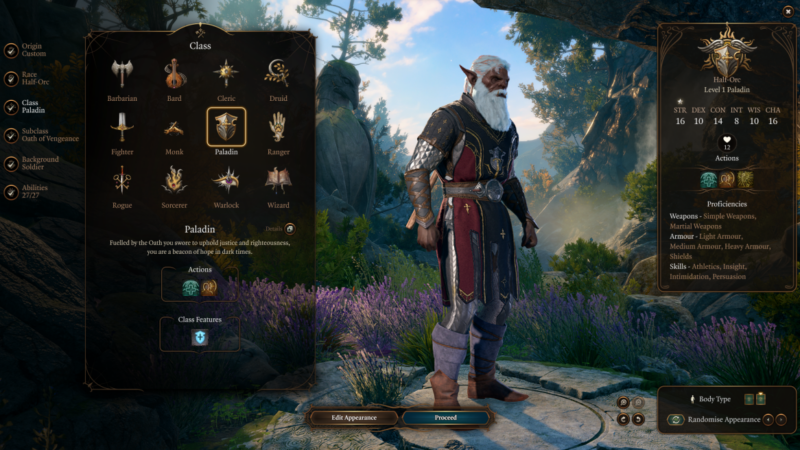
At Level one follow our character creator to pick all correct background, race, skills, and ability distribution focusing on Strength and Charisma. Pick the Vengeance subclass here. Unlike every other subclass in the game, Oathbreaker requires you to be level 2 or higher and break your Oath. Consequently, for now, just pick Vengence and will adjust with subclass passives and features at level 3.
- Lay on Hands: Use your blessed touch to heal a creature or cure it of all diseases and poisons. Single target melee heal using action or cure disease.
- Divine Sense: Gain Advantage on Attack Rolls against celestials, fiends, and undead. This uses bonus action which can be used in conjunction with an attack costing action.
Oathbreaker Paladin Gameplay & Priorities
During the early stages of BG3, the Oathbreaker Paladin is a powerful unarmed melee fighter who should equip a Two-Handed Greatsword. Your primary goal is to find a back-bar ranged weapon at the start of the game. Unfortunately, you will have limited mobility early on and the Heavy Crossbow or Longbow is great until you reach higher levels Moreover, look to acquire the Elixir of Bloodlust or Potion of Invisibility. Bloodlust helps trigger an extra action on kill and Invisibility helps you stay alive if you’re in trouble.
Read More: All Acts in BG3 Ranked
Your overall priority with the Oathbreaker Paladin build is the following:
- Complete Prologue
- Recruit Other Companions
- Reached Hollowed City/Druid Grove
- Sell, Stock up, complete quests
- Unlock Withers, respec to proper ability score
- Progress to level 5
- Reach Underdark and Grymforge
Following these steps ensures a strong foundation for her especially if you plan on playing solo or on Honour Mode difficulty.
Level 2
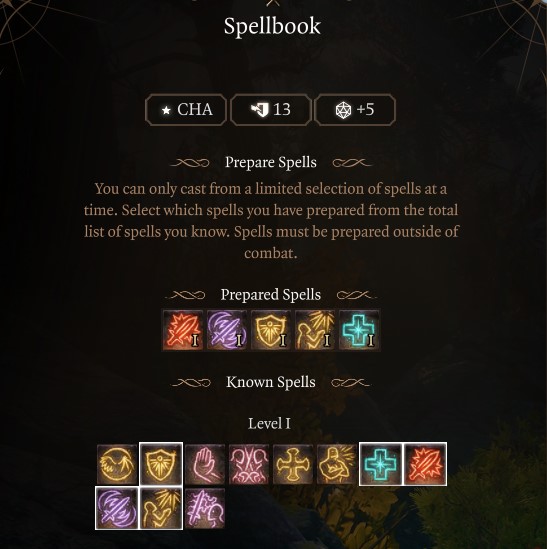
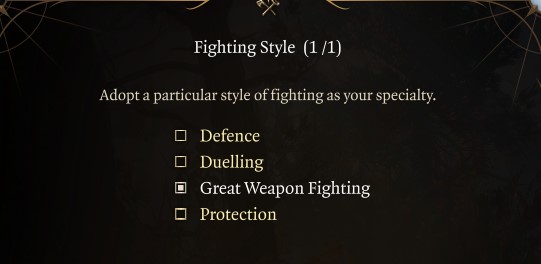
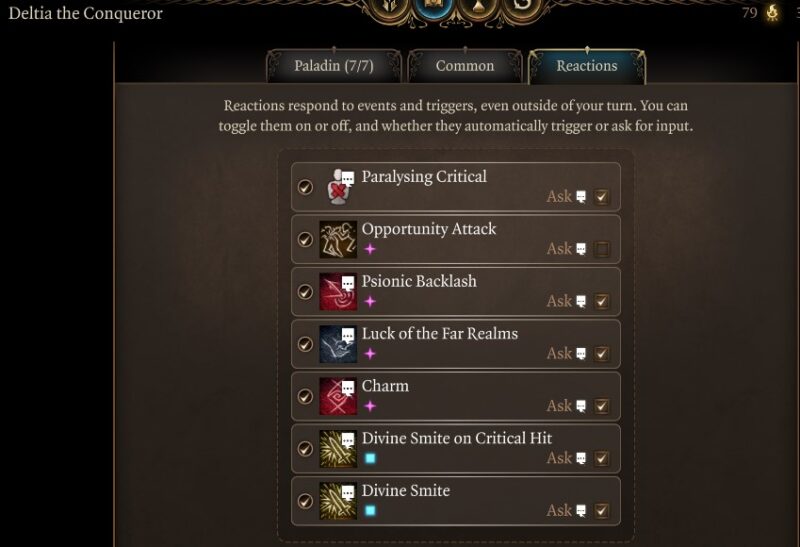
At level two you gain access to five prepared spells and you can unlock your Subclass. In order to unlock the Oathbreaker Subclass, you need to break your Oath. The fastest way is to betray the Tiefling holding Lae’zel hostage. Additionally, you can lie to goblins blocking the goblin camp and kill them immediately following. Above our character creator walks you through these steps. Therefore, if you don’t see the popup, that is why, you need to pursue it, unlike other subclasses in the leveling menu.
Great Weapon Fighting style can also be unlocked at level two. Great Weapon Fighting is a passive feature when you roll a 1 or 2 on a damage die for an attack with a Two-Handed melee weapon, that die is rerolled once This minimizes low-damage rolls and keeps your damage high especially using a Two-Handed weapon like a Greatsword.
Read More: Best Patch 8 Subclass Tier List in Baldur’s Gate 3
Divine Smite: uses spell slot and hits in conjunction with weapon strike. Can be automatically applied, only during critical hits or have a popup box via the reaction’s menu.
Suggested Prepared Spells for Level 2 Oathbreaker Paladin
- Shield of Faith: Surround a creature with a shimmering field of magic that increases its Armour Class by 2.
- Use a bonus action and increase Armour Class by 2. This requires concentration and should be used prior to fights where you expect to take the majority of the damage.
- Cure Wounds: Touch a creature to heal it.
- Usage: decent melee-based hell that consumes an action and spell slot. Early in the game, not having healing or potions spells doom, and depending on group composition, this spell can be flexed in or out.
- Divine Favor: Your prayer empowers you with divine radiance. Your weapon attacks deal an additional 1d4 Radiant Damage.
- Usage: this spell is great because it consumes a bonus action, not an action. This also gives you additional Radiant Damage, which you can pair with Divine Smite for huge damage early in the game. Concentration is required with this spell.
- Thunderous Smite: Your weapon rings with thunder as you strike, pushing your target 3m away and possibly knocking it Prone.
- Usage: This attack can be paired with Divine Smite and acts like Crowd Control and knockback when you need a stun. Ideally used when you expect huge incoming damage if an opponent isn’t knocked in prone.
- Searing Smite: Your Weapon deals an extra 1d6 Fire damage and marks the target with Searing Smite. A target with Searing Smite takes 1d6 icon bg3 wiki guide 11d6 Fire damage every turn until it succeeds on a Constitution saving throw.
- Usage: this is your hard-hitting single-target spell that also gives a damage-over-time fire effect. Consider this a good option if you cannot one-shot an opponent and don’t need to Crowd Control them.
Smite Considerations
At this stage, consider saving your spell slots for melee attacks with divine smite. Moreover, Thunderous and Searing Smite spells can be powerful, but they consume a bonus action along with action and a spell slot. Thus, you need to be very specific when using it, or you will waste two types of resources in one attack. The Paladin seems overly complex at first, with a tool of spells. Keep it simple, attack with a melee weapon, trigger Divine Smite, and repeat.
Level 3
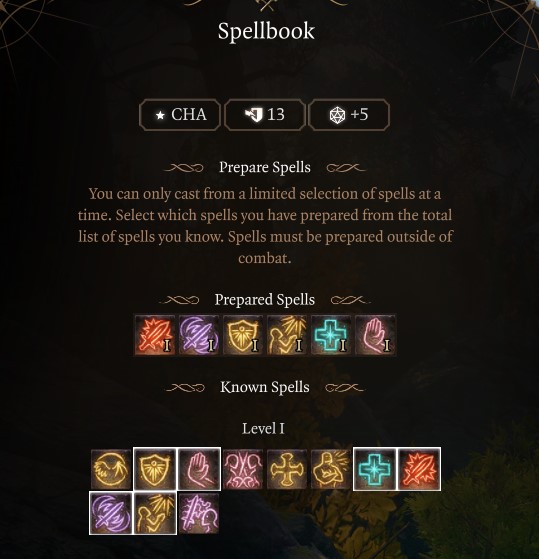
Upon reaching Level three you will unlock another Level 1 spell slot, Divine Health, and subclass features. At this point, you need to break your Oath so you can unlock the full potential of the build. You can do this by finding an NPC and betraying them. I usually do this when entering Blighted Village.
- Gain another level 1 spell slot up to three.
- Gain Divine Health: prevents the disease from affecting you.
- Gain one more prepared spell
- Gain 4 subclass spells
Command: Command a creature to flee, move closer, freeze, drop to the ground, or drop their weapon. This is your crowd control ability that can be used at range. My favorite is prone, taking away action and bonus action from a hard-hitting enemy. Take this if you have another support character with you.
Subclass features for Level 3 Oathbreaker Paladin
- Hellish Rebuke: The next time you take damage, you use your Reaction to surround your attacker in hellish flames that deal 2d10 fire damage. Amazing utility skill that does some damage back to attackers for you with a reaction, not an action.
- Inflict Wounds: 3d10 necrotic damage within melee range. This is a very high spell tooltip at the beginning and usually, a Cleric spell. On a Paladin stick with Smite if you have it.
- Dreadful Aspect: Let your darkest emotions burst forth as a menacing pulse to Frighten nearby enemies. A great are-based spell that uses channel oath charges (not spell slots). This causes fright which can lock in enemies in place for you.
- Control Undead: Use the power of your Oath to gain control over an undead creature. The undead will follow you around and attack your enemies. A channeled Oath charge which is awesome because you can get a summon that helps with damage passively. You will need to find an undead creature and cast it which will maintain its following you until a long rest without the need for concentration. Highly recommend using your oath charge on this ability.
Gameplay for Level 3 Oathbreaker Paladin
This level revolves around doing damage with melee attacks primarily. You will be spell slot “Starved.” Make sure to click Reactions and select Ask when it comes to Divine Smite. Otherwise, it will do a lot of extra damage for you but consume spell slots rapidly. What ends up happening is, for every engagement you’re out and cannot cast Thunderous Smite in conjunction with Divine Smite. Later in level progression, you will have many more slots and thus easier to manage and do damage. Consequently, expect to do long rest A LOT. Therefore you’ll want to stock up on supplies as you are progressing.
Defensive, use Bless before combat for offensive potential, or Shield of Faith when you expect to take a lot of damage. Use Thunderous and Searing Smite only on big enemies where you need to kill them in one turn only if you do not intend to use a bonus action.
Level 3 Paladin Prepared Spells: Searing Smite, Thunderous Smite, Shield of Faith, Divine Favour, Cure Wounds, Command.
Level 4
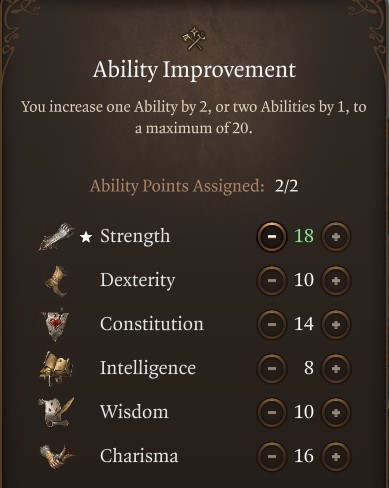
Reaching Level four gives you a very important decision between increasing your ability score like Strength or taking a feat. Feats give you a big benefit but doing so will have you miss out on Ability Improvements. Simply increasing your main stat strength to 18 is the simplest and easiest way to advance your character. You can do this by selecting Ability Improvement rather than +2 to strength.
At level 8 we will take Great Weapon Master feat. This will keep our build simple at the moment. Moreover, we’ll be hitting hard with a better percentage chance with a melee weapon.
You get one additional spell to slot and I recommend Protection from Evil and Good.
- Protection from Evil and Good: Protect an ally against the attacks and powers of aberrations, celestials, elementals, fey, fiends, and undead. The target can’t be Charmed, Frightened, or possessed by them, and when these creatures attack it, they do so with a disadvantage.
- Usage: this is a niche spell for this build and is not used often. It comes in handy in particular fights where your character is crowd-controlled on turn one and does nothing but sit there charmed. Otherwise, take another skill you find more appealing and consider this a flex.
Gameplay: remains unchanged at this level. Expect more damage and better chances to land an attack. Keep leveling to get more spells and more spell slots.
Level 4 Paladin Prepared Spells: Searing Smite, Thunderous Smite, Shield of Faith, Divine Favour, Cure Wounds, Command, Protection from Evil and Good.
Level 5
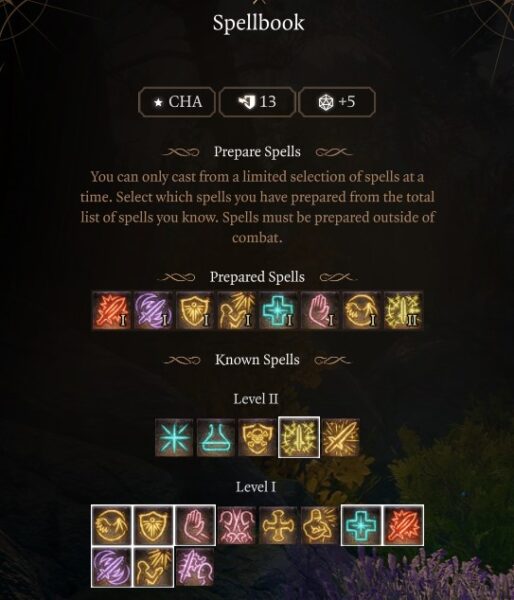
At level 5, the Paladin and Oathbreaker subclass unlocks a lot. Extra attack, more spell slots, and two subclass spells.
Additional effects and bonuses:
- Level 1 Spell Slot Unlocked
- Level 2 Spell Slot Unlocked
- 1 Extra Prepared Spell (take Protection from Poison)
- Extra Attack: Beginning at level, you can attack twice, by the Attack action on your turn. This combined with Divine Smite and the added spell slots allows you to mega single target damage pure turn.
- Subclass Spells
Branding Smite: deals 2d6 radiant damage and Possibly marks your target with light, preventing it from turning Invisible. Another hard-hitting Smite with 2d6 radiant this makes it perfect against specific targets. Don’t sleep on the preventing from turning invisible. Beyond level 5, many enemies, and bosses will attempt to slip away invisible with a potion or a spell. Shut them down with this site.
Crown of Madness (Oath Spells): Instill madness in a humanoid enemy, making them attack the creature closest to them (other than you), even if it’s allied and requires a concentration of 3 turns.
Darkness (Oath Spells): Create a cloud of magical darkness that Heavily Obscures and Blinds creatures within. Creatures cannot make ranged attacks into or out of it.
Level 5 Paladin Prepared Spells: Searing Smite, Thunderous Smite, Shield of Faith, Divine Favour, Cure Wounds, Command, Protection from Evil and Good, Branding Smite.
Level 6
At level 6 the Paladin unlocks 1 more prepared spell bringing the total to 9. Additionally, you also get the Aura of Protection.
- Aura of Protection: You and nearby allies gain a bonus to Saving Throws equal to your Charisma modifier. Make sure to activate it once unlocked in the passive section of the toolbar.
Spell
- Magic Weapon: Infuse a weapon with arcane energy. The weapon becomes magical, receiving a +1 bonus to Attack and Damage Rolls.
- Usage: this is a decent buff to damage, but it comes at the cost of a high-level spell slot and concentration. Another decent spell to add to our arsenal.
Once you unlock Aura of Protection you need to activate it for its effect. Gameplay not much changes at this level.
Ending Act 1 as a Way of the Oathbreaker Paladin
Around Level 6 you should be close to the resolution of Act 1 content. Be sure to check with merchants and restock on any needed camp and alchemy supplies. Additionally, make sure to look over what the best Act 1 items are. Furthermore, make sure you haven’t skipped any of the permanent bonuses you can find in Act 1. Moreover, the Grymforge has powerful armor and weapons (Adamantine) which can be used well into Act 3. Consider taking the time to collect the Mithral, Mould, and Craft items before moving on to Act 2. The game will alert you when you go to leave the area, but once you move onto the Shadow-Cursed Lands you can’t go back.
Level 6 Paladin Prepared Spells: Searing Smite, Thunderous Smite, Shield of Faith, Divine Favour, Cure Wounds, Command, Protection from Evil and Good, Branding Smite, Magic Weapon.
Level 7
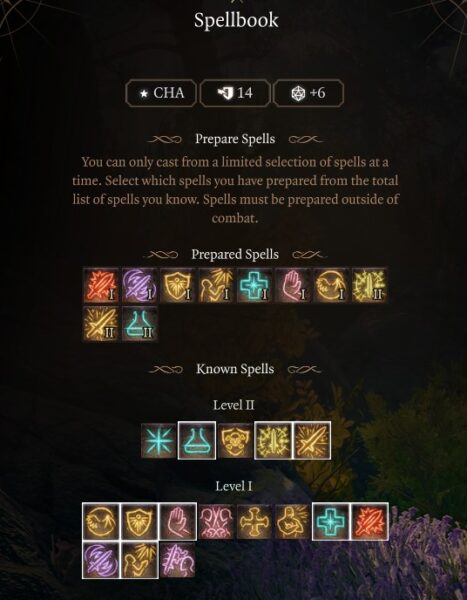
At Level 7 the Paladin unlocks an additional level 2 spell slot and Aura of Hate subclass feature.
Aura of Hate (Subclass Feature): You and any nearby fiends (and undead) gain an additional 2 to damage dealt with melee weapons. The aura disappears if you fall Unconscious 3m radius. This is an awesome subclass feature to go along with level 3 control dead and eventually level 9 animate dead. Activate for the free the first time you unlock it and keep it active.
Lesser Restoration: Cure a creature from disease, poison, paralysis, or blindness. Used in rare circumstances, but when an ally is critically paralyzed you need them to be able to take a turn.
Gameplay: not much changes and we are about to level 8 for a BIG boost in power with one of my favorite feats in the game.
Level 7 Paladin Prepared Spells: Searing Smite, Thunderous Smite, Shield of Faith, Divine Favour, Cure Wounds, Command, Protection from Evil and Good, Branding Smite, Magic Weapon, Lessor Restoration.
Level 8
Unlock a feat, which we suggest Great Weapon Master.
Great Weapon Master feat which does the following: When a melee attack scores a critical hit or kills a creature, you can make another melee attack as a bonus action. When attacking with Heavy Weapons you are proficient with, attack rolls take a -5 penalty, but their damage increases by 10.
The Great Weapon Master feat does two things for you. One, it has a high risk high reward ability to add 10 damage BUT -5 attack roll penalty. As shown in the picture above, this simply reduces your chance to hit the percentage significantly. You can turn this off in the Passive section on your toolbar, which will give you the normal percentage.
Secondly, this feat gives you another chance to hit on a kill or critical hit using a bonus action. This is the real reason the feat is so strong, multiple attacks in a turn, and with this build, you will be getting a lot of critical hits and kills. Combat should therefore be initiated using your action first, saving your bonus action for a Great Weapons Master attack.
Levels 9
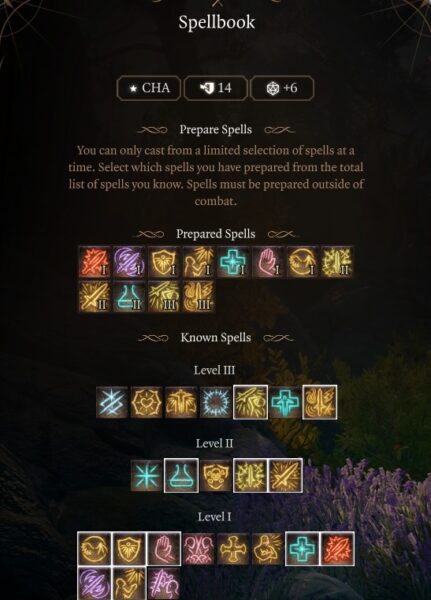
At level 9, the Oathbreaker Paladin unlocks 2 Level 3 Spell Slots and two subclass spells.
Subclass features for Level 9 Oathbreaker Paladin
- Bestow Curse: Curse a creature with your touch. The curse either bestows Disadvantage on checks and Saving Throws or attacks, lets you deal additional damage to the target, or robs it of its actions. This is a semi-week oath skill because it costs an action and simply curses and debuffs the target. I prefer to kill outright and don’t see this being that useful.
- Animate Dead: Create an undead servant from a corpse. This is a very useful skill that needs to be used outside of combat. You must find a dead corpse (well, or create one) and then use your level 3 spell slot for it. This acts as a friendly combatant and doesn’t require concentration. It’s worth a level 3 spell slot in my opinion and a great addition to the build.
Spell Selection for Level 9 Oathbreaker Paladin
- Blinding Smite: +3d8 radiant damage and possibly Blind your target. This spell is your big nuke using Smite along with Blind it makes it a must-have and our primary usage of level 3 spells.
- Elemental Weapon: Imbue a weapon with elemental power. It receives a +1 bonus to Attack Rolls and deals an additional 1d4 damage of your choice. Consider this an enhanced Divine Favour adding +1 to attack rolls as well. The downside is it costs an action and a level 3 spell slot. However, if you can pre-buff using this before a fight expect even more damage.
Gameplay: At this level, you have even more in your arsenal. Most of the added spells will be used in niche situations. Your bread and butter remain the same, Smite damage. With Blinding Smite you have a hard counter against fellow martial weapon users. Additionally, giving the Blind debuff alongside 3d8 radiant damage is massive. Keep things simple and use your off-healing, crowd control, and utility only when needed.
Note on prepared spells, make sure to drop Compelled Duel so you can pick up two level 3 spells.
Level 9 Paladin Prepared Spells: Searing Smite, Thunderous Smite, Shield of Faith, Divine Favour, Cure Wounds, Command, Protection from Evil and Good, Branding Smite, Magic Weapon, Lessor Restoration, Blinding Smite, Elemental Weapon.
Level 10
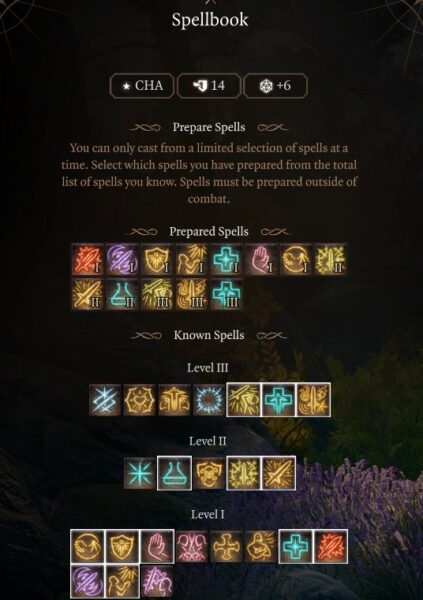
The level 10 Oathbreaker Paladin unlocks the following in Baldur’s Gate 3:
- Lay on Hands Charge
- Aura of Courage: You and any nearby allies can’t be Frightened. The aura disappears if you fall Unconscious.
- 1 Spell (take Revivify)
- Revivify: Revive a companion. They return to life with 1 hit point. Typically you can throw potions or use the help function but this can be useful for long-range to bring someone back.
Gameplay remains unchanged at this level with more utility.
The Level 10 Paladin Prepared Spells: Searing Smite, Thunderous Smite, Shield of Faith, Divine Favour, Cure Wounds, Command, Protection from Evil and Good, Branding Smite, Magic Weapon, Lessor Restoration, Blinding Smite, Elemental Weapon, Revive.
Level 11
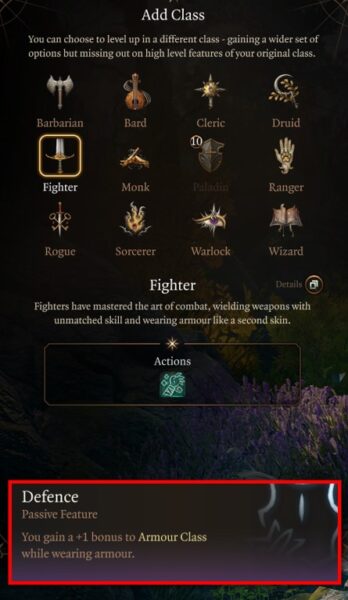
At level 11 the Paladin doesn’t get much beyond an extra spell and another level 3 spell slot. Consequently, I recommend spending the last two levels multi-classing this class. Investing two levels into Fighter will give you a passive +1 Armour Class (AC) for using armor and a god-tier skill, Action Surge. If you want to stick with Paladin, you can choose another spell at this level, and at level 12 pick +2 strength feat. However, I suggest taking two levels into Fighter to increase your action potential, which increases your damage significantly.
Having 20 strength with another Ability Improvement is great. However, you get even more with potions of Hill Giant, 21 and 27 depending on the usage. I typically do not recommend multi-classing, but the Paladin can benefit from another action once per fight.
- Defence Fighting Style: While you are wearing armor, you gain a +1 bonus to AC. This is a passive benefit at level 1 Fighter and will help with survival.
- Second Wind: this skill is unlocked at level one Fighter and is a mediocre heal that is useful during the start of the game. You can use a bonus action, though most potions outperform it.
If you multi-class, this level will feel uneventful, but trust me it’ll be worth it. Prepared Spells remain unchanged from here on out.
Level 12
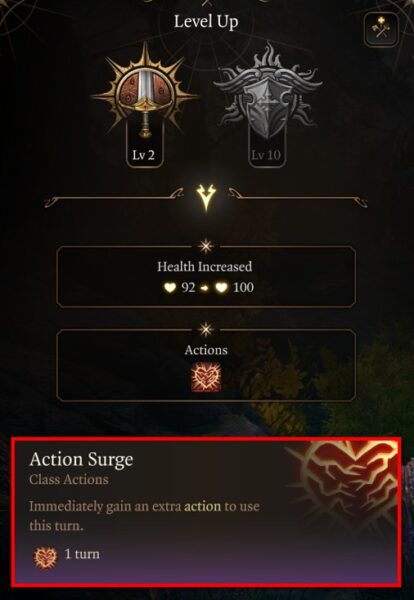
Finally, with two levels into Fighter, you get access to the awe-inspiring Action Surge. You get an extra action, but the biggest strength is, it doesn’t require any resources to use it. Action Surge is a once-per-fight usage, but it allows you to cast another spell, attack, dash, etc. It gives you that extra oomph that no other class has.
You take your Paladin with Extra Attack and give it Action Surge for 2x more attacks. You can take this a step further by using either a Potion of Haste or casting Haste on yourself. Then you get another action! If you did the math on that:
- Attack one + extra attack = 2
- Attack two (via Action Surge) + extra attack = 4
- Attack three (via Haste) + extra attack = 6
- Great Weapon Master via critical strike or kill = 7 (if you have a bonus action)
The Paladin at level 12 with this setup has so much firepower it’s remarkable. Again, if you wanted a traditional Paladin for all 12 levels, take ability improvement +2 strength or the Alert feat which helps with going early. We hope you enjoyed this build and check out the gear section for more.
Best Gear for Baldur’s Gate 3 Paladin Oathbreaker Build
In Games like Baldur’s Gate 3, you’ll explore the world, loot chests and your enemies’ dead bodies, and complete quests, and all those activities can reward you with useful items, potions, armor, weapons, scrolls, and much more. There are three Acts in BG3, and Best Baldur’s Gate 3 Paladin Oathbreaker Build Guide includes suggested sets and alternatives for Act 1 and Act 3.
Beginner: Starting the Game
Here’s the best beginner gear for Paladin Oathbreaker Build in Baldur’s Gate 3:
| Gear Slot | Best Gear Item | Effect |
|---|---|---|
| Head | Helmet of Smiting | Heal on Smite |
| Cape | – | |
| Chest | Adamantine Splint Armour | 18 AC, Reduce damage |
| Gloves | Gloves of the Growling Underdog | Advantage when surrounded |
| Boots | Disintegrating Night Walkers | Mobility and Misty Step |
| Necklace | Amulet of Misty Step | Free Misty Step |
| Ring | Crusher’s Ring | +3 Movement |
| Ring | Caustic Band | +2 Acid damage |
| Weapon 1 Main Hand | Sword of Justice | Free Shield of Faith |
| Weapon 2 Main Hand | Titanstring Bow | Add STR modifier |
Below is the Best Act 1 Armour, Weapons, and Equipment for the Oathbreaker Paladin in BG3:
- Helmet of Smiting: Located in Underdark Selûnite Outpost X: 163 Y: -248 (Alternatives Haste Helm, Cap of Wrath, or Grymskull Helm).
- Adamantine Splint Armour: Crafted in Adamantine Forge (Alternatives Chain Mail +1, or Githyanki Half Plate).
- Gloves of the Growling Underdog: Chest behind Razglin’s throne room. (X:295 Y:69) (Alternatives Gloves of Heroism, Gloves of Dexterity, or Gloves of Missile Snaring).
- Disintegrating Night Walkers: Obtained in Gyrmforge as part of Free True Soul Nere questline (Alternatives Boots of Striding, Boots of Genial Striding, or Boots of Speed).
- Moondrop Pendant: Sealed chest inside the Owlbear Nest (Alternatives Amulet of Branding, Amulet of Misty Step, or Amulet of Restoration).
- Crusher’s Ring: Can be looted or stolen from Crusher in the Goblin camp (Alternatives Strange Conduit Ring, or Ring of Absolute Force).
- Caustic Band: Obtained from merchant Derryth Bonecloak in the Myconid Colony (Alternatives Fetish of Callarduran Smoothhands, or The Sparkswall).
- Sword of Justice: Looted from Anders near Karlach (Alternatives Silver Sword of the Astral Plane, or Everburn Blade).
- Titanstring Bow: Brem in Zhentarim Hideout (Alternatives Bow of Banshee, Spellthief, or Giantbreaker).
Advanced: End-Game
The following table presents the best advanced and end-game gear for Paladin Oathbreaker Build in Baldur’s Gate 3:
| Gear Slot | Best Gear Item | Effect |
|---|---|---|
| Head | Helm of Balduran | Cannot be Stunned |
| Cape | Fleshmelter | Deals Acid DMG |
| Chest | Helldusk Armour | 21 AC |
| Gloves | Gauntlets of Hill Giant Strength | Strength to 23 |
| Boots | Helldusk Boots | Mobility and Hellcrawler |
| Necklace | Amulet of Greater Health | Constitution to 23 |
| Ring | Killer’s Sweetheart | Auto Critical |
| Ring | Ring Of Regeneration | Heal on each turn |
| Weapon 1 Main Hand | Balduran’s Giantslayer | +3 Legendary Greatsword |
| Weapon 2 Ranged | Darkfire Shortbow | Resistance to Cold & Fire |
Below is a list of the best Act 3 Equipment for the Oathbreaker Paladin Build:
- Helm of Balduran: Obtained in Dragon’s Sanctum (Alternatives Helldusk Helmet, Sarevok’s Horned Helmet, or Mask of Soul Perception).
- Fleshmelter: Found in Chest in House of Healing Morgue (Alternative Cloak of Protection).
- Helldusk Armour: Dropped by Raphael in the House of Hope (Alternatives Armour of Devotion, Armour of Persistence, Bhaalist Armour).
- Gauntlets of Hill Giant Strength: Obtained in Archive of the House of Hope (Alternatives Helldusk Gloves, Legacy of the Masters, or Gloves of Soul Catching).
- Helldusk Boots: In a locked chest, Wyrm’s Rock Fortress X: -32 Y: 219 (Alternative Disintegrating Night Walkers).
- Amulet of Greater Health: Found in the House of Hope in Baldur’s Gate City (Alternative Surgeon’s Subjugation Amulet, or Periapt of Wound Closure).
- Killer’s Sweetheart: Obtained from the Gauntlet of Shar in Act 2 (Alternative Ring of Protection, Risky Ring).
- Ring Of Regeneration: Sold by Rolan at Sorcerous Sundries (Alternative Ring of Free Action, Shifting Corpus Ring).
- Balduran’s Giantslayer: Obtained as a reward for completing the Wyrmway trials (Alternatives Sword of Chaos, or Silver Sword of the Astral Plane).
- Darkfire Shortbow: Sold by trader Damon Act 2 Last Light Inn X: -35 Y: 169 (Alternative Fabricated Arbalest).
Best Paladin Consumables, Potions, and Items
The following list represents the best individual use consumable items that will aid in our Best Baldur’s Gate 3 Paladin Oathbreaker Build:
- Elixir of Hill Giant Strength: Increases Strength ability score to 21 until Long Rest.
- Potion of Speed: Gain extra action, +2 AC, Advantage on Dexterity Saving Throws, and double movement speed.
- Elixir of Bloodlust: Once per turn when you kill a foe, you gain HP 5 temporary hit points and an additional action.
- Drow Poison: Weapon poison that adds Constitution Saving Throw or becomes Poisoned and falls Asleep.
- Potion of Flying: Drink to gain a flying speed of 60ft for one hour.
- Elixir of Heroism: Gain 10 temp HP and become Blessed until a long rest.
- Potion of Greater Healing: 4d4 + 4 hit points restored.
- Oil of Accuracy: Coat Weapon. Bonus of +2 in Attack Rolls.
- Elixir of Vigilance: Drink to gain a +5 bonus to Initiative and you can’t be Surprised.
- Elixir of Darkvision: (only non-Darkvision race): Drink to gain the ability to see in the dark up to 12m.
Permanent Bonuses
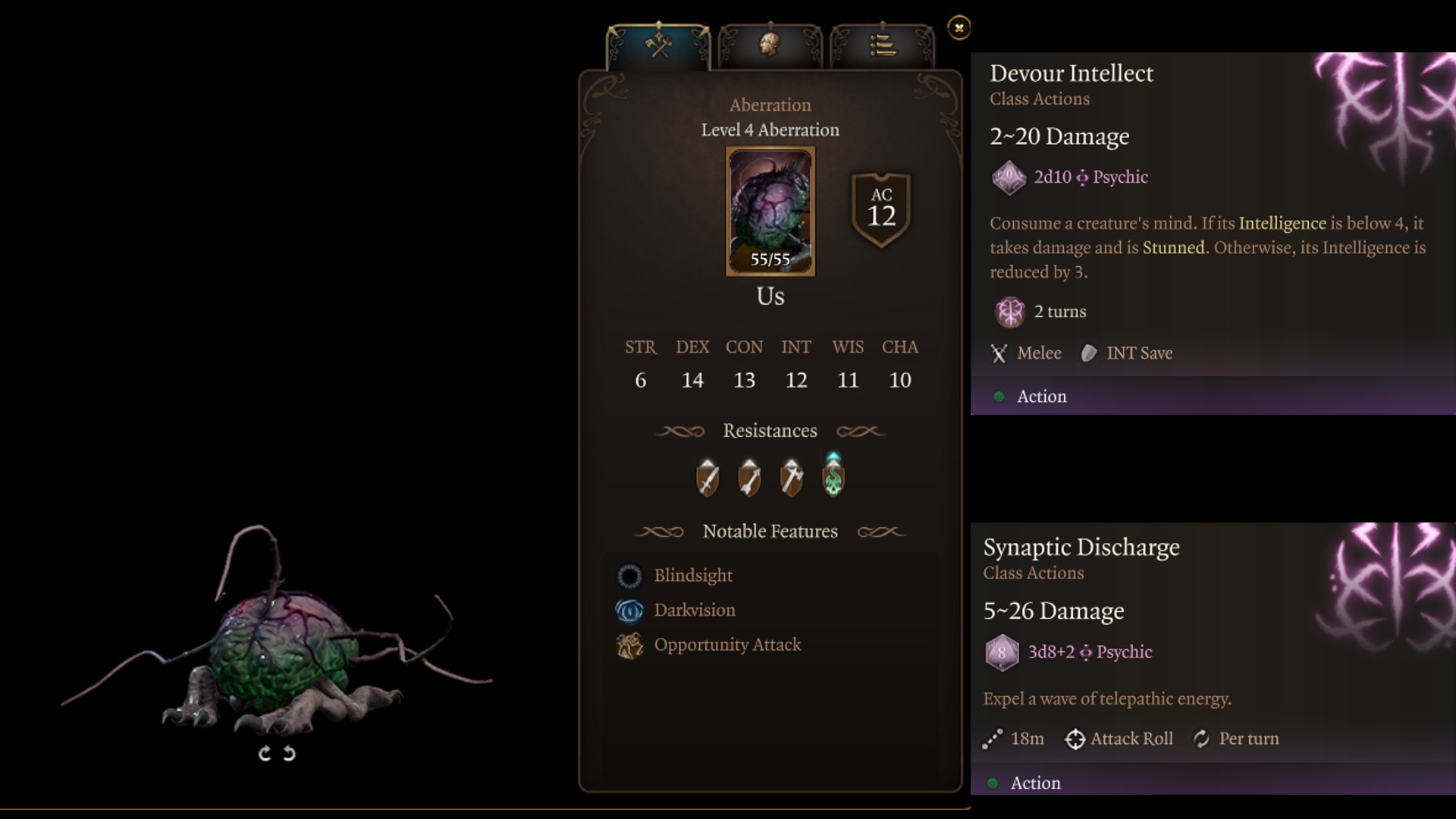
Throughout Baldur’s Gate 3, you will have the ability to gain permanent bonuses to your character. These can grant additional spells, ability scores, and other bonuses. Permanent Bonuses are not displayed throughout the campaign but are vital to increase overall combat performance. We have all permanent bonuses here in a guide, but the most important ones for you to collect are listed below.
| Act 1 | Act 2 | Act 3 |
|---|---|---|
| Auntie Ethel’s Hair: Gain +1 to an Ability Score. | Potion of Everlasting Vigour: Gain +2 Strength. | Mirror of Loss – +2 to an Ability Score of your choice. |
| Awakened: Use illithid powers as a Bonus Action. | Slayer Form: Ability to transform into the Slayer. | Partial Ceremorphosis: Access to tier 3 illithid Powers. |
| Scratch: Gain Find Familiar Scratch. | Summon Us: Allows you to summon Us. | Sweet Stone Features: Blessed permanent. |
| Cheeky Quasit: Gain Summon Quasit Shovel. | Statue of the Gods: +2 to Saving Throws | |
| Loviatar’s Love: 30% Hit Points or less, you gain a +2 bonus to Attack Rolls and Wisdom saving throws. | ||
| Necromancy Of Thay: access to powerful spells in Act 3. | ||
| Volo’s Ersatz Eye: See Invisibility |
Best Permanent Bonuses for Oathbreaker Paladin in Baldur’s Gate 3
Oathbreaker Paladin Combat, Gameplay, and Tips
Here are 10 gameplay tips specifically for playing the Best Baldur’s Gate 3 Paladin Oathbreaker Build:
- Spell Slots: use your spell slots wisely, especially for Divine Smite and Healing
- Divine Smite: use this extra damage source on the hardest to defeat enemies and save your spell slots for when you really need it.
- Healing: use potions that consume bonus actions or Lay on Hands for yourself or an ally.
- Heavy Armor: find and equip this early for needed AC.
- Crowd Control: make sure to CC enemies with Thunderous Smite or a Companion ability to limit damage.
- Pre-Buff: cast Blessed prior to combat to get a roll Advantage.
- Range: don’t forget to equip a ranged weapon to ensure you can do damage on nearly every turn.
- Long Rest: use the rest at camp function to regain spell slots and don’t go into a fight with zero.
- Great Weapon Master: focus on low-health targets with your first action to strike a kill and another attack with Great Weapon Master.
- Toggle Reactions: make sure both Divine Smite and Great Weapon Master are toggled on or off when you need them.
Oathbreaker Paladin Changes in Patch 7 for BG3
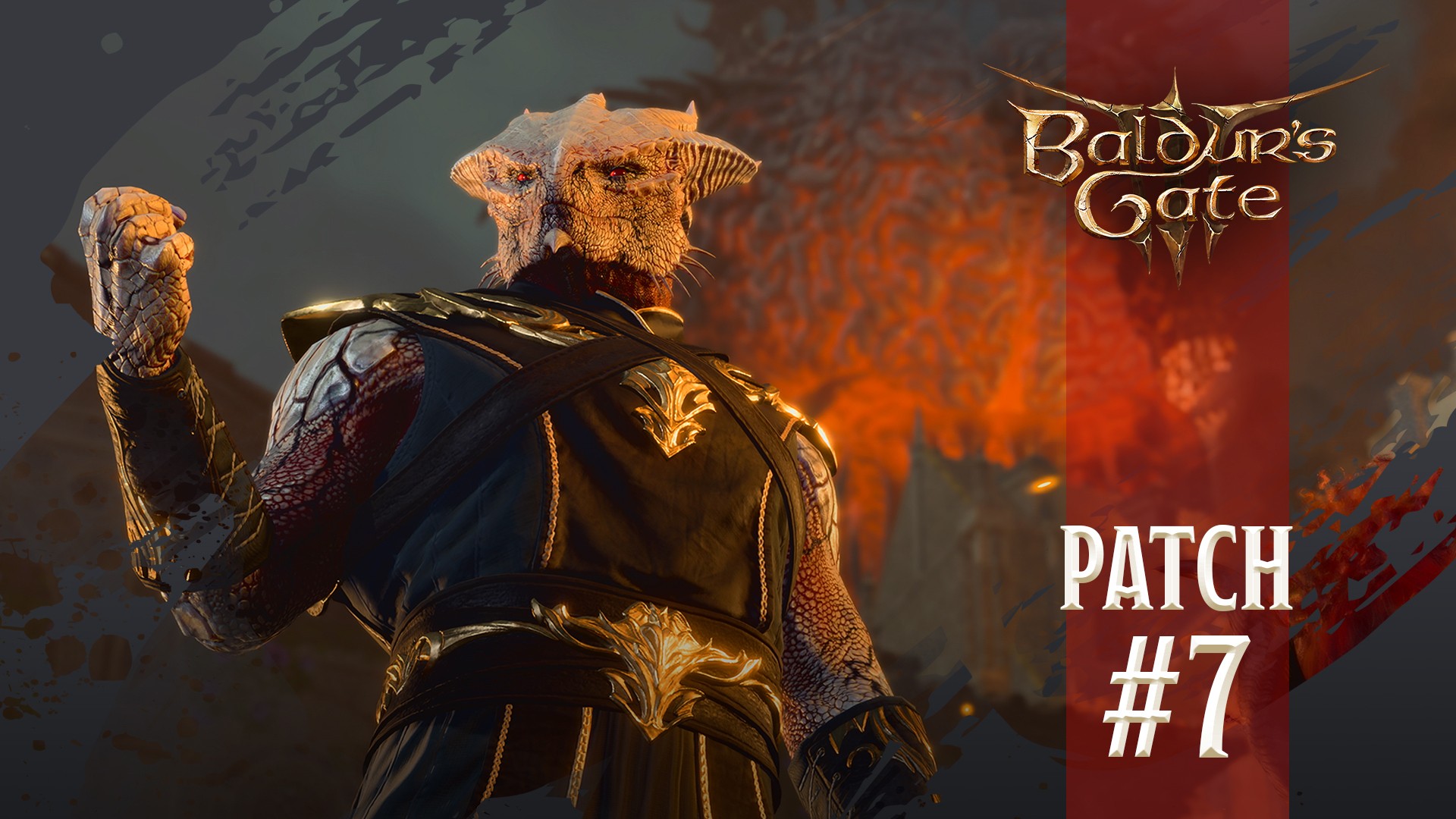
The Oathbreaker Paladin class didn’t get any changes in Baldur’s Gate 3 Patch 7. Nothing major has changed if you’re already familiar with how the class works.
The big focus of this patch is on mods. Larian Studios has introduced a modding toolkit and an in-game mod manager, so players can now create and install mods directly within the game. This update lets the community take creative control, allowing players to make their content and expand the game’s story in new ways. As a result, this Oathbreaker build guide stays the same in Patch 7.
Baldur’s Gate 3 Paladin Oathbreaker Build Summary Guide
Subclass Oathbreaker
Armor: Heavy
Weapons: Greatsword
Race – Half-Orc
Background – Soldier
- Strength: 16
- Dexterity: 10
- Constitution: 14
- Intelligence: 8
- Wisdom: 10
- Charisma: 16
Level Progression
- Level 1 – Pick Any Subclass
- Level 2 – Break Oath Goblin Camp
- Level 3 – Command
- Level 4 – Feat +2 Strength
- Level 5 – Branding Smite
- Level 6 – Magic Weapon
- Level 7 – Lesser Restoration
- Level 8 – Great Weapon Master
- Level 9 – Blinding Smite
- Level 10 – Aura of Courage
- Level 11 – Multiclass Fighter
- Level 12 – Action Surge
FAQs
Q. What happens if I become an oathbreaker in Paladin BG3?
Ans. Becoming an Oathbreaker Paladin in BG3 changes your character’s mechanics, roleyplay options, and powers.
Q. Is it better to break Paladin oath BG3?
Ans. It depends entirely on your playstyle preferences, goals, and combat preferences. Breaking the oath improves your power boost, synergizes well with evil companions, and more roleplaying flexibility.
Q. How to quickly become an oathbreaker in Paladin BG3?
Ans. To become an Oathbreaker Paladin in BG3, you need to violate your oath.
Looking For More About Baldur’s Gate 3?
Thank you for reading the Best Baldur’s Gate 3 Paladin Oathbreaker Build. We provide the latest news and create guides for Baldur’s Gate 3. Also, watch me play games on Twitch or visit my YouTube channel!
 Reddit
Reddit
 Email
Email
